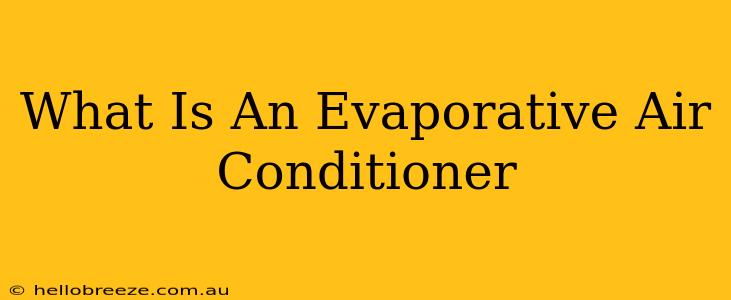Evaporative air conditioners, also known as swamp coolers, offer a cost-effective and energy-efficient way to beat the heat, particularly in dry climates. Unlike traditional air conditioners that use refrigerants, evaporative coolers work by evaporating water, a process that naturally cools the air. This guide will explore how they work, their advantages and disadvantages, and help you decide if an evaporative air conditioner is the right choice for your home.
How Does an Evaporative Air Conditioner Work?
The core principle behind evaporative cooling lies in the physics of evaporation. When water evaporates, it absorbs heat energy from its surroundings. This heat absorption leads to a decrease in the surrounding air temperature. Evaporative air conditioners utilize this principle in a simple yet effective way:
- Water Intake: The unit draws water from a reservoir.
- Water Distribution: The water is distributed across a wet pad or filter, typically made of cellulose or other absorbent material.
- Air Intake: A fan draws in hot, dry outside air.
- Evaporation: As the hot, dry air passes over the wet pad, the water evaporates. This evaporation process cools the air.
- Air Circulation: The now-cooled air is then circulated into your home or space.
Essentially, evaporative air conditioners are using the natural process of evaporation to cool the air, rather than using chemical refrigerants like traditional AC units.
Types of Evaporative Air Conditioners
There are several types of evaporative coolers available, each with its own characteristics:
- Direct Evaporative Coolers: These are the most common type. They directly draw in outside air, pass it over a wet pad, and then circulate it indoors. They're ideal for dry climates.
- Indirect Evaporative Coolers: These coolers use two separate air streams. One stream passes over the wet pad, while the other stream is cooled via heat exchange with the evaporatively cooled stream. They are more suitable for slightly humid climates.
- Hybrid Evaporative Coolers: These units combine evaporative cooling with refrigeration, offering flexibility in different climate conditions.
- Portable Evaporative Coolers: These small, self-contained units are easy to move and ideal for individual rooms or smaller spaces.
Advantages of Evaporative Air Conditioners
- Energy Efficiency: Swamp coolers are significantly more energy-efficient than traditional air conditioners, resulting in lower electricity bills.
- Cost-Effectiveness: They are generally cheaper to purchase and install than traditional AC units.
- Improved Air Quality: The evaporation process adds moisture to the air, which can be beneficial for dry climates and people with respiratory issues. However, it's crucial to use clean water and maintain the unit to avoid mold growth.
- Environmentally Friendly: Using less energy contributes to a smaller carbon footprint.
Disadvantages of Evaporative Air Conditioners
- Humidity: Swamp coolers are not suitable for humid climates. Adding more moisture to already humid air will make the environment feel sticky and uncomfortable.
- Water Consumption: They use a considerable amount of water, especially in hot, dry conditions.
- Maintenance: Regular cleaning and maintenance are required to prevent mold and mildew growth.
- Air Quality Concerns: While they can improve air quality in some aspects, poor maintenance can lead to the growth of mold and bacteria within the unit, negatively impacting air quality.
Choosing the Right Evaporative Air Conditioner
The best type of evaporative air conditioner for you depends on your specific needs and climate. Consider these factors:
- Climate: High humidity renders evaporative coolers ineffective.
- Space to be Cooled: Choose a unit appropriately sized for the area.
- Budget: Consider both initial cost and ongoing maintenance expenses.
Conclusion
Evaporative air conditioners provide a viable and economical cooling solution for many, especially in dry climates. By understanding how they work and weighing their advantages and disadvantages, you can make an informed decision about whether a swamp cooler is the right choice for keeping your home cool and comfortable. Remember to prioritize regular maintenance to ensure optimal performance and air quality.

